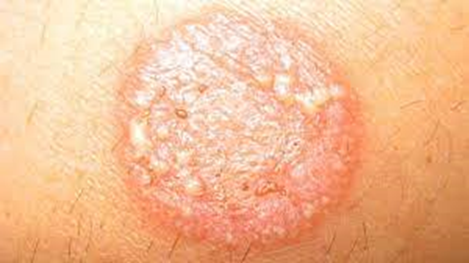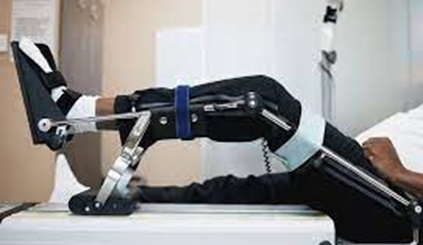A nurse is reinforcing teaching about the care of a client who has tinea corporis with a newly licensed nurse. Which of the following should the nurse include in the teaching?
Place on airborne precautions.
Avoid direct contact.
Isolate for 24 hr. after lesions appear.
Administer a broad-spectrum antibiotic.
The Correct Answer is B
Choice A Reason:
Place on airborne precautions. This is incorrect. Tinea corporis isn't transmitted through the air. Airborne precautions are specific infection control measures for diseases transmitted through airborne particles, like tuberculosis or measles, which are caused by specific bacteria or viruses.
Choice B Reason:
Avoid direct contact is correct. Direct contact is a crucial precaution to prevent the spread of tinea corporis. It's a contagious infection, often transmitted through skin-to-skin contact or by sharing contaminated items such as clothing, towels, or bedding. Encouraging precautions like not sharing personal items and avoiding direct skin contact helps prevent the spread of the infection to others.
Choice C Reason:
Isolate for 24 hr. after lesions appear is incorrect. While it's essential to take precautions to prevent spread, isolating for only 24 hours after lesions appear might not be sufficient. The infection can remain contagious until it's effectively treated and lesions have resolved. More extended isolation or precautions might be necessary until the infection is no longer transmissible.
Choice D Reason:
Administer a broad-spectrum antibiotic is incorrect. Tinea corporis is a fungal infection, not a bacterial one, so antibiotics would not be effective against it. Antifungal medications, such as topical or oral antifungals, are the primary treatment for tinea corporis. Using an antibiotic would not treat the fungal infection and might lead to inappropriate medication use.

Nursing Test Bank
Naxlex Comprehensive Predictor Exams
Related Questions
Correct Answer is D
Explanation
Choice A Reason:
Setting the degree of flexion and extension as tolerated by the client is generally appropriate in a CPM device, but this should be done within the prescribed range recommended by the healthcare provider. Simply allowing the client to adjust the degree of flexion and extension without guidance might lead to overextension or inadequate movement, potentially causing discomfort or hindering recovery.
Choice B Reason:
Padding the CPM device with a thick pillow isn't the recommended approach. CPM devices typically come with appropriate padding to ensure comfort and proper positioning. Using a thick pillow might alter the device's mechanics or cause uneven support, affecting the intended movement of the knee.
Choice C Reason:
Placing the client in high-Fowler's position (sitting upright at a 90-degree angle) isn't a standard or necessary position for using a CPM device after a knee arthroplasty. The client can typically use the CPM device while lying in a comfortable and relaxed position, following the healthcare provider's instructions regarding positioning during CPM therapy.
Choice D Reason:
Aligning the client's joints with the joints on the frame is essential for the correct function of the CPM device. This alignment helps in providing the intended range of motion without causing unnecessary stress or strain on the knee joint.

Correct Answer is B
Explanation
Choice A Reason:
LDL (Low-Density Lipoprotein) is incorrect. This is a type of cholesterol and is not specifically monitored in relation to warfarin therapy.
Choice B Reason:
INR (International Normalized Ratio) is correct. Warfarin is an anticoagulant medication, and its dosage needs to be adjusted based on the INR levels. INR monitoring helps assess the clotting tendency of the blood and ensures that the dosage of warfarin is within the therapeutic range to prevent blood clots without causing excessive bleeding.
Choice C Reason:
BUN (Blood Urea Nitrogen) is incorrect. This value is primarily used to assess kidney function and is not directly related to monitoring warfarin therapy.
Choice D Reason:
Hct (Hematocrit) is incorrect. This measures the percentage of red blood cells in the blood and is not directly related to monitoring warfarin therapy for atrial fibrillation.
Whether you are a student looking to ace your exams or a practicing nurse seeking to enhance your expertise , our nursing education contents will empower you with the confidence and competence to make a difference in the lives of patients and become a respected leader in the healthcare field.
Visit Naxlex, invest in your future and unlock endless possibilities with our unparalleled nursing education contents today
Report Wrong Answer on the Current Question
Do you disagree with the answer? If yes, what is your expected answer? Explain.
Kindly be descriptive with the issue you are facing.
